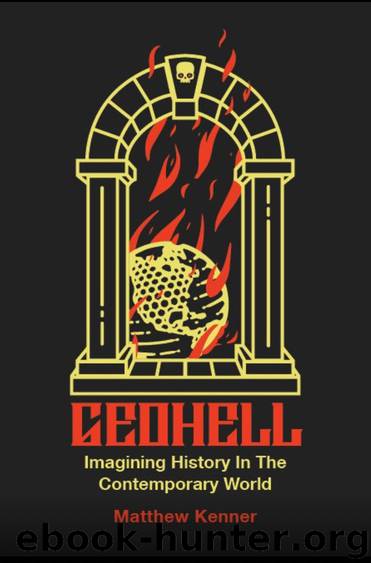Geohell: Imagining History in the Contemporary World by Matthew Kenner

Author:Matthew Kenner [Kenner, Matthew]
Language: eng
Format: epub
Publisher: Gatsby Inc
Published: 2016-11-25T23:00:00+00:00
II
Going Back to the Beginning: Industrialization, Financial Politics, and the Necessity of Empire
It’s hard to say precisely when, but certainly by 1898 a plan was in place to inextricably synchronize the global actions of two separate States: the old British Empire and what was among the most newly emergent Great Powers, the United States. Militaries must work, most broadly, according to grand strategies, referring to the conscious total distribution of a militarized entity’s resources over geographical space, not to battle strategies, meaning the overall plans driving individualized acts of warfare. By definition, then, there must also be individuals formulating the strategies, or plans – there must be planners. In 1898 and 1899, the United States’ lead planners, its grand strategists, would instigate wars on two fronts, in two different hemispheres, which nonetheless had a single aim in common; this single aim represented a perfect example of what I mean by “grand strategy”.
The U.S. Government claimed the aim was to aid in the “liberation” of two Spanish colonies from their imperial mother: Cuba in the Western hemisphere, and the Philippines in the Eastern. “Secretly”, but what was nonetheless still quite obvious (even to some observers at the time),[cccviii] the purpose was to officially initiate the U.S. into the Great Power game, which at this point in history was evermore quickly becoming a fully globalized contest. As it turns out, this initiation, more than any other factor, would aid in that globalization’s completion. On the British side, true execution of the grand strategy didn’t officially start until 1899, when the almighty British Empire instigated a war against the tiny Boer republics in what’s today South Africa, so as to ensure that, if ever necessary, British interests would be in position to exercise strategic control over the latest South African discovery of an unprecedented supply in precious minerals, this time in the form of gold. Ultimately the plan belonged to a cabal headed by Cecil Rhodes, who, upon his death in 1902, would become the namesake of Oxford University’s much sought-after Rhodes’ scholarship. Rhodes had for years spoken of the need to institute tighter management over the British Empire, which he imagined would someday operate in the form of a global confederation of States, managed by an omnipotently maneuvering central organization. Rhodes wanted the latter to be directed from the top by a tiny ‘Society of the Elect’ – with himself at the head, of course. He referred to this idealized cadre as a “Church for British Empire”, envisioning that it should work much like the Jesuits.[cccix]
Why was it necessary for these two monumental episodes, near-simultaneous yet otherwise so seemingly disparate, to be so intimately connected? Primarily, it was already quite clear at the time that both States, the U.K. and the U.S., had one great enemy in common: the rising German Empire. The parties with greatest influence over U.S. governmental policy had come to particularly abhor German penetration into the U.S.’s “sphere of influence” in the Caribbean and Central and South America. Despite the decades-old U.
Download
This site does not store any files on its server. We only index and link to content provided by other sites. Please contact the content providers to delete copyright contents if any and email us, we'll remove relevant links or contents immediately.
| Africa | Americas |
| Arctic & Antarctica | Asia |
| Australia & Oceania | Europe |
| Middle East | Russia |
| United States | World |
| Ancient Civilizations | Military |
| Historical Study & Educational Resources |
Guns, Germs and Steel by Diamond Jared(2372)
Collapse: How Societies Choose to Fail or Succeed by Jared Diamond(1520)
The Emperor of All Maladies by Siddhartha Mukherjee(1445)
Transcendence by Gaia Vince(1142)
148424513X by Unknown(1080)
Seven Skeletons by Lydia Pyne(1078)
Civilization One by Christopher Knight(1014)
Sapiens - A brief history of humankind (Marathi) by Yuval Noah Harari(998)
The Rational Optimist: How Prosperity Evolves by Matt Ridley(968)
THE MASTER AND HIS EMISSARY by Iain McGilchrist(946)
Guns, Germs, and Steel: The Fates of Human Societies by Jared M. Diamond(943)
At Home by Bill Bryson(912)
Underworld The Mysterious Origins of Civilization by Graham Hancock(908)
How the Irish Saved Civilization by Thomas Cahill(901)
Marco Polo by Laurence Bergreen(898)
Atrocitology by Matthew White(886)
Ancient Iraq by Georges Roux(868)
Guns, Germs and Steel: The Fates of Human Societies by Jared Diamond(856)
The World Until Yesterday: What Can We Learn From Traditional Societies? by Jared Diamond(855)
